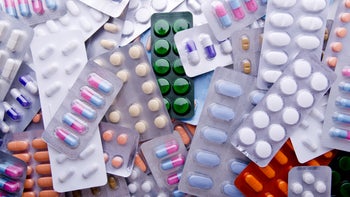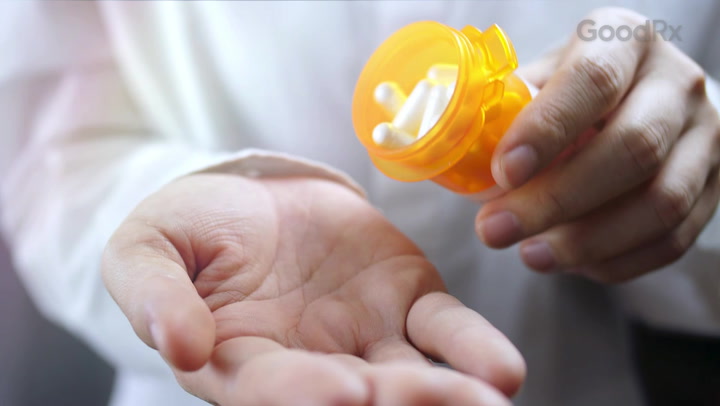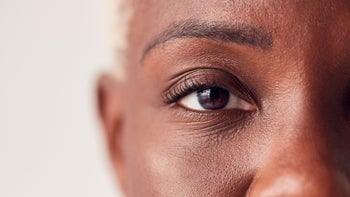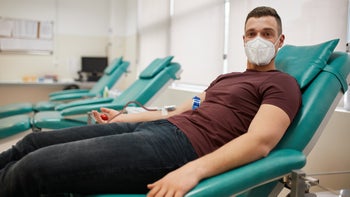
Is Your Medication Causing Dry Mouth?
Key takeaways:
Dry mouth (xerostomia) can be caused by many factors, including medications.
Common medications that cause dry mouth are diphenhydramine (Benadryl), Adderall (amphetamine salts), and oxybutynin. Many antidepressants, opioids, and benzodiazepines, among other medications, can also cause dry mouth.
If you’re experiencing dry mouth, it’s recommended to talk to a healthcare professional. They can help you find a treatment plan that addresses or fixes your symptoms.
Table of contents

In most cases, you probably don’t think about saliva. But, when you don’t have enough of it, the resulting discomfort from dry mouth (xerostomia) can be hard to ignore.
Dry mouth symptoms often appear when you’re a little dehydrated. They can also stem from medical conditions such as Sjögren disease, hepatitis C, and diabetes. However, in many cases, you may be taking one or more medications that cause dry mouth.
Here, we’ll list medications that can affect your saliva and cause dry mouth. We’ll also review what you can do to combat this bothersome side effect.
Search and compare options
Medications that cause dry mouth
Many medications have the potential to cause dry mouth, or cottonmouth. Some of the most common are discussed below. Although it’s not a complete list, you can use this section as a reference when reviewing your medication list to look for possible causes of dry mouth.
Anticholinergics
Anticholinergics are a large group of medications. They treat health conditions such as allergies, asthma, and overactive bladder. But they’re also a common cause of dry mouth. This is because anticholinergics have a drying effect. They can stop or slow the production of things such as tears, mucus, and saliva. In fact, dry mouth is often a key reason why people stop taking anticholinergics.
For instance, oxybutynin is an anticholinergic medication that treats overactive bladder. But dry mouth affects over 70% of people who take the immediate release (IR) version. Other overactive bladder medications that can lead to dry mouth are:
Darifenacin
Fesoterodine (Toviaz)
Solifenacin (Vesicare)
Tolterodine (Detrol)
Trospium
Antihistamines that treat allergies, particularly first-generation antihistamines, can also cause dry mouth. They have a similar anticholinergic effect on your body. These include:
Diphenhydramine (Benadryl)
Chlorpheniramine
Hydroxyzine hydrochloride
Hydroxyzine pamoate (Vistaril)
Many other commonly prescribed medications have anticholinergic effects, too. We’ll discuss these more below.
Antidepressants
Serotonin and norepinephrine reuptake inhibitors (SNRIs) and selective serotonin reuptake inhibitors (SSRIs) are common antidepressants that cause dry mouth. Like the medications above, they have anticholinergic effects.
These antidepressants include:
Venlafaxine (Effexor XR)
Duloxetine (Cymbalta)
Citalopram (Celexa)
Escitalopram (Lexapro)
Paroxetine (Paxil)
Fluoxetine (Prozac)
Sertraline (Zoloft)
Other types of antidepressants also cause dry mouth. Tricyclic antidepressants — such as amitriptyline, nortriptyline (Pamelor), and clomipramine (Anafranil) — can cause your mouth to make less saliva.
Stimulants
Stimulant medications that treat ADHD are known to cause dry mouth. Adderall (amphetamine salts), Ritalin (methylphenidate), and Concerta (methylphenidate ER) are all common culprits.
Dry mouth is thought to be a short-term side effect of these ADHD treatments, but the specific way they affect your saliva isn’t totally clear.
Opioids
Opioids — such as morphine (MS Contin), oxycodone / acetaminophen (Percocet), and hydromorphone (Dilaudid) — are prescription medications that treat severe pain. They have many possible risks, but one of the less severe ones is dry mouth. Again, this is due to anticholinergic effects.
Benzodiazepines
Benzodiazepines are controlled substances that most often treat anxiety. They can cause dry mouth due to their anticholinergic effects. Relevant benzodiazepines include:
Alprazolam (Xanax)
Lorazepam (Ativan)
Diazepam (Valium)
Temazepam (Restoril)
Antipsychotics and mood stabilizers
Other psychiatric medications can affect your saliva too. Antipsychotics and mood stabilizers are some of the top culprits:
Haloperidol (Haldol)
Chlorpromazine
Fluphenazine
Olanzapine (Zyprexa)
Risperidone (Risperdal)
Quetiapine (Seroquel)
Clozapine (Clozaril)
Lithium (Lithobid)
Other medications
Again, this isn’t an exhaustive list of medications that cause dry mouth. Many medications that don’t fit into the categories above can cause dry mouth.
For instance, dry mouth can pop up as a result of taking:
Parkinson’s disease medications, such as benztropine
Certain heart and blood pressure medications, such as furosemide (Lasix) and propranolol (Inderal LA)
Certain muscle relaxers, such as tizanidine (Zanaflex)
Certain nausea medications, such as promethazine
Disopyramide (Norpace)
Gabapentin (Neurontin, Gralise, Horizant)
If you’re taking a medication or supplement that you think is causing dry mouth, make sure to talk to your pharmacist or prescriber. They can let you know if your medication might be contributing to your symptoms.
Bringing moisture back: No matter the cause, there are several ways to lessen the symptoms of dry mouth. These are the top treatments to consider.
Do you wake up with a dry mouth? Learn how to prevent this discomfort moving forward.
Medication-induced dry mouth: Anticholinergics are common culprits behind dry mouth symptoms. Here’s what to know about this diverse class of drugs and the side effects they cause.
Dry mouth remedies
You should talk to your prescriber if you develop dry mouth. They can recommend dry mouth treatments to consider. Likely options include:
Stopping the offending medication: It’s not always possible to stop a medication that’s causing dry mouth, especially if it treats a chronic condition. ADHD, bipolar disorder, Parkinson’s disease are common examples of this. But in some cases, your prescriber may be able to switch you to a different medication that doesn’t cause dry mouth.
Tweaking your oral habits: Rinsing with cold water, using mouthwash, sucking on ice chips, and chewing sugarless gum can all help with salivation.
Evaluating your diet: Try to avoid foods that are salty, acidic, or dry. They can make symptoms worse. Alcohol, caffeine, and tobacco can also make dryness worse.
Drinking more water: Hydrating frequently can help alleviate dry mouth symptoms.
Considering saliva substitutes: There are a number of products available that can supplement or replace your saliva. They include gels, aerosols, gums, and more. Many of them are available over the counter.
Trying a new medication: Nobody likes taking medication solely to treat the side effects of another one. But in some cases, it may be necessary. Cevimeline (Evoxac) and pilocarpine (Salagen) are prescription medications that can improve salivation and make dry mouth less of a problem.
Frequently asked questions
Make sure that you’re doing your part to prevent dry mouth. This includes staying well-hydrated, maintaining good oral hygiene, and cutting back on dehydrating substances such as coffee, alcohol, and tobacco. You can also stimulate saliva production by sucking on hard candies, lozenges, or dried fruits.
Cevimeline and pilocarpine are the main medications that are used to moisten your mouth. They’re both available with a prescription from a healthcare professional. Cevimeline comes as an oral capsule, while pilocarpine comes as a tablet. Over-the-counter saliva substitutes such as Biotène are also available, but they’re not considered medications.
If you experience dry mouth at night, consider using a dry mouth-formulated toothpaste or mouthwash before bed. Turning on a humidifier at night can also lessen your symptoms. However, if your symptoms are intense or persistent, your healthcare professional is best equipped to make more specific recommendations. They can also offer advice on how to safely reduce mouth breathing and snoring, which are factors that can exacerbate nighttime dryness.
The bottom line
Dry mouth is a side effect of many medications. Overactive bladder medications, antihistamines, and many mental health medications are all known to cause or worsen dry mouth symptoms. This is also true for opioids, benzodiazepines, and ADHD stimulants, among others.
If you have dry mouth and think it’s caused by one of your medications, talk to a healthcare professional. They can help you identify a treatment plan to alleviate your discomfort.
Why trust our experts?


References
Alhejoury, H. A., et al. (2021). Artificial saliva for therapeutic management of xerostomia: A narrative review. Journal of Pharmacy & BioAllied Sciences.
Bryant Ranch Prepack. (2023). Oxybutynin chloride- oxybutynin chloride tablet [package insert].
Cappetta, K., et al. (2018). Meta-analysis: Risk of dry mouth with second generation antidepressants. Progress in Neuro-Psychopharmacology & Biological Psychiatry.
Church, M. K., et al. (2013). Pharmacology of antihistamines. Indian Journal of Dermatology.
Götrick, B., et al. (2009). Effects of amphetamine on salivary secretion. European Journal of Oral Sciences.
Kim, J. H., et al. (2009). Histamine H1 receptor induces cytosolic calcium increase and aquaporin translocation in human salivary gland cells. Journal of Pharmacology and Experimental Therapeutics.
Mason, O. W. (2020). Choosing the best medication for adult ADHD. Children and Adults with Attention-Deficit/Hyperactivity Disorder.
Roganović, J., et al. (2018). Pharmacodynamic causes of xerostomia in patients on psychotropic drugs. ACTA Scientific Dental Sciences.
Sankar, V., et al. (2015). Xerostomia. The American Academy of Oral Medicine.
Tanasiewicz, M., et al. (2016). Xerostomia of various etiologies: A review of the literature. Advances in Clinical and Experimental Medicine.
Was this page helpful?
Related Articles
Browse medications
View AllResearch prescriptions and over-the-counter medications from A to Z, compare drug prices, and start saving.

























